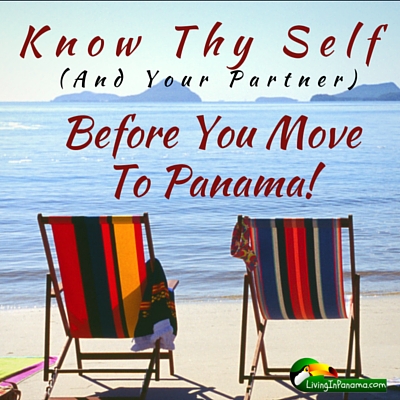
They said that the house that they have been renting in Boquete is being sold. They are now looking around & weighing their options, before buying some place. They seemed to really like Puerto Armuelles.
As we were showing them our available properties around Puerto, we also pointed out a couple of houses that are for sale by expats in town.
Expats who are moving back to the states, after as many as ten years of living in Puerto Armuelles.
We were happy to put these potential house buyers in touch with the sellers. With luck, these buyers and sellers can come to an agreement. (Please note, we are not real estate agents. But we are always happy to hook people up with others who might have what they are looking for.)
The interesting point about both of the sellers of these houses in Puerto Armuelles, was that they are both retired couples who have been in Panama longer than they would have liked. In each case, the husband was the one who really liked life down in Panama, for its simplicity, and for the low cost of living.
Both wives have told us that they would much rather have stayed in their home states, to be closer to family and friends. The move to Panama, from the outset, was not the best decision for the women. It was more to please her husband. The decision seemed more based on the low cost of living than a desire to live in Panama and to explore what Panama has to offer.
In each of these cases, thanks to a recently more vibrant real estate market, the people in question have either sold their properties or are generating interest from potential buyers. So they will soon be able to move on with their lives. However, things could have turned out far worse.
This story is a perfect example of why we strongly recommend that those who are considering a move to Panama take our quiz and do their own research on Panama.
Above all, do not purchase land, before you get to know the country. In particular, get to know the area of Panama in which you want to live. Go there and then wait at least six months before buying. Although, we didn’t didn't do that.
Do not get caught up in feelings of scarcity, or competition. If someone else buys your dream property, then it was just not meant to be. No matter what your “instincts” tell you. Moving and investing in Panama is a decision that you should make with your pre-frontal cortex. Analyze everything. Don't listen to the pretty beach property saying, “Buy Me Now!” Just take a deep breath, and let it be for awhile.
It is very important for couples to communicate honestly and clearly about their personal wishes for their retirement “adventure” in the tropics. For example, if the husband is focused on investing the family's entire life’s savings in tropical real estate, but all the wife really wants is to spend a few peaceful years in the tropics swimming in the ocean and doing some serious reading, then this is a recipe for conflict, emotional stress, and possibly divorce.
Of course, who can say that these couples might not have found some other trap to fall into, if they had retired in the States rather than in Panama? These restless husbands might have invested all their money in a trailer park in the States, and the couples might have discovered that they hate running a trailer park. Or he could have bought the Brooklyn bridge... But like moving to Panama, these life decisions should first be investigated fully - and together.
The lesson that I am hoping to share is that, while our family has benefitted greatly from the many new experiences that resulted from our decision to move to Panama, this might not be the right decision for your family.
Consider carefully. Do your research. Talk to people.
Visit Panama at least once, for at least a month, or two, or six. You may love it, as we do. However, maybe in your case, the answer might simply be “No” it’s not for you, or not for your partner (this should mean “no” for both of you, unless you were planning on divorcing anyway). It is better to be happily married in Alberta, than unhappily married in a tropical paradise.
Or, maybe you are better off planning your finances carefully, so that you can afford to live part time in your home in the north, and part-time in Panama. Or, it could turn out that Panama is absolutely a perfect fit for you, and your partner, full time - for your retirement, for your business, for your investments.
In conclusion, I would say, give Panama a try. See if it is a good fit for you and your partner. But, be patient, don’t try to force Panama to fit your retirement dream. Especially, if it is evident that it is not going to be a comfortable fit.
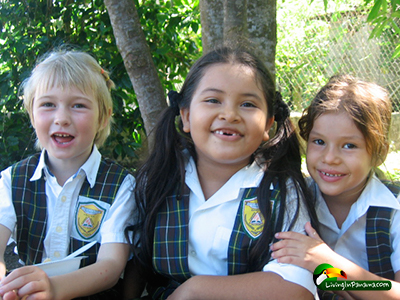
Although, the longest that I ever attended one of these schools was four months. This is because the style of teaching is so different from what it is in the US.
In the schools here, the teacher has the only text book in the class. So a lot of the time spent in class is occupied with either copying your down your lessons off the white board, or
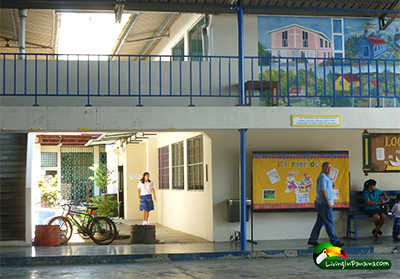
copying down your homework. For some reason the school system seems allergic to printing out worksheets.
I've heard from several of my friends that still attend school here, that they only go to school to see their friends. The quality of learning leaves much to be desired, and the curriculum is mediocre at best.
The students learn math and history and the other essentials, but the there seems to be no emphasis on reading or continuing your education beyond high school.
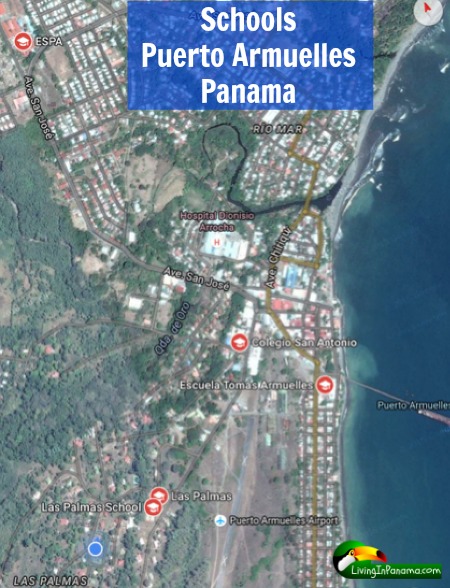
There are good things too, for example in some schools you can play a variety of sports and can learn many of the traditional dances. All the schools have a marching band, and they all participate in a yearly city parades.
If you're looking into schools here there are a few things you might want to know.
First, of all the schools here Escuela Secondario de Puerto Armuelles (ESPA) is the largest and most highly recommended in town. From what I've heard it also has the highest standard for learning. It is also the only one with a band with instruments, other than the drum and xylophone.
You may also want to read a post I (Betsy) wrote about schools in Panama. It includes a short video of my daughter Skylar in her 1st grade class here in Panama.
Among the other schools here, the one I attended most recently was San Antonio. San Antonio is known as one of the higher profile schools in town. This school is a three in one: elementary, middle, and high school, all in one large building. It has kept up a reputation as a fairly good school for the last 50 years. However it's elementary school is known to be poorer quality then some of the others in town. The middle school is supposed to be one of the best. San Antonio was the school that made me
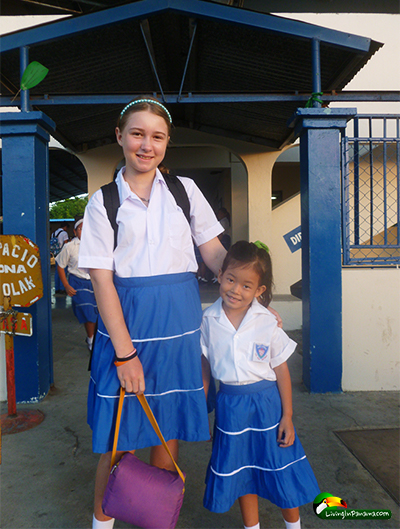
decide that the Panamanian school system was not for me.
The last school on this short list is the Las Palmas school, which is located, of course, in the Las Palmas neighborhood. This is the school I have attended most frequently, three times to be exact.
My take-away from the Las Palmas School is that it is highly over-estimated. A couple of decades ago, at the end of the Chiquita years, the Las Palmas school was the best in town. And now over twenty years later people still believe it to be one of the best schools.
However the truth is that with the contribution of bad principals and teachers, the school has deteriorated. This school is supposedly bilingual, but from my experience the school's English teachers speak worse English then an American five year old. That may be a bit harsh, but it's the truth.
The students I've met that have attended the Las Palmas school can barely string together a sentence in English.
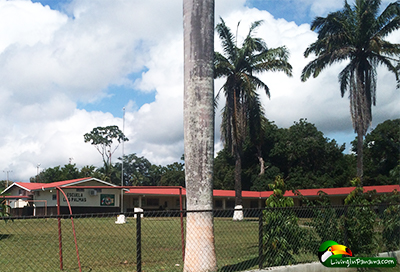
Oh fun fact before I go, the original Las Palmas school building was burnt to the ground, maybe in hopes of erasing it from the school system. But is was rebuilt, and sadly still features ever the decreasing teaching and learning standards taught there.
This is, of course, only a brief summery of the most popular schools here in Puerto.
I have provided a list of all schools in Puerto Armuelles at the end of the article, as well as
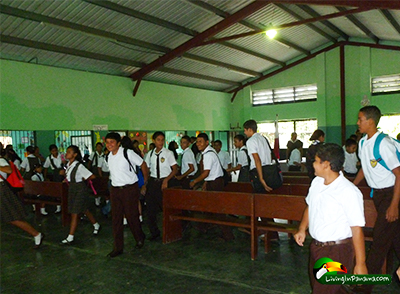
their geographical locations.
If you can't find one of the schools on the map you may have to ask around town.
If you would like more information about a particular school ask me in the comments.
Thanks for reading.
Skylar.
This article was written by my 14 year old daughter, Skylar Vayda. Over the winter, Skylar will be writing a Panama-related articles. She will be picking the topic. We hope you enjoy them.
P.S. School starts here in just a few days -Monday, Feb. 29, 2016.
It set back and removed from the main road. Yet it is still close to neighbors.
And best of all, it is only 70 feet from the beach.
Check it out.
[leadplayer_vid id="56D17C4FECEB0"]
To find out more about this property for sale click here.
You could build whatever you like here. It is level and fully accessible. As the video suggests, you could build 2-3 homes or a hotel. You could also keep the whole thing to yourself.
The property is in the Corazon de Jesus neighborhood of Puerto Armuelles. It is a friendly community right on the beach.
It is an area popular with expats. All the beachfront in the neighborhood has already been bought up by expats.
You can browse more property for sale in Puerto Armuelles here.
Puerto Armuelles is an increasing popular place for both expat retirees and investors. This is due, in part, to the near completion of the new 4 lane highway linking Puerto Armuelles to the Panama's InterAmericana main highway. The improved access has allowed many more people to discover the many charms of this wonderful beach town.
You will be more successful, if you know your goals before you begin
Once you are clear about your investment goals, not only does the whole process get easier, but you are much more likely to achieve your goals.
Which of these goals is yours?
1. Buying for Capital Gain
In the world of emerging markets, intrepid investors seek out not-yet-discovered locations. The idea is to buy in a location BEFORE it is discovered by too many other foreigners.
These investors buy in those emerging locations and wait. They simply wait until the market arrives and prices start rising due to increased demand. Of course, finding these locations is the key. The purchase may be in a remote area. But that is only a good idea if there are clear indications that infrastructure improvements will follow. If such investors are buying within a development, they tend to purchase early in the roll-out of the master-plan, and look to secure ‘founder’ or ‘charter membership’ deals as a result.
These capital growth investors will sell the property when their target resale price is easily achieved. Of course, the next buyer can also still make significant capital gains, but typically less than the pioneers in these not-yet-discovered areas can achieve.
2. Buying for Personal Use
This is usually someone looking for a vacation home. This investor wants a place to recuperate from their daily life. Usually they are looking to buy property in places that enjoy a good climate, access to amenities and where the lifestyle is very different from their life at 'home'.
Sometimes this investor also wants to rent out the property when they aren't using it. However, while they like the idea of a rental covering some of the costs, rental income is not their top priority. This investor type tends to be affluent and own more than one home, often in a different part of the world. Their overseas property(s) may be part of their larger investment plan.
However, if the location is still affordable, people without this kind of wealth can also enjoy 'a second home in the tropics lifestyle'.
3. Buying for Rental Income
These investors are looking to create a cash flow stream through rental income. Vacation rentals usually provide a much greater rental income than other types of rentals.
This investor seeks out locations that attract a sufficient number of potential renters, such as foreign vacationers, travelers, and retirees. Of course, this investor needs to buy property where the return on investment (ROI) pencils out.
Sometimes, people who are retiring overseas, will also invest in a rental property in order to supplement their retirement income. Or they will rent out their property until they are able to retire there full-time.
4. Buying for Retirement Overseas
Investors in this category are typically 5-6 years from retirement. They are looking for property that will provide them their ideal retirement lifestyle - and one they can afford. This means these retirees must be clear on both their retirement budget and their retirement lifestyle goals. Then they can be sure that the property purchase will meet both.
Oversea retirees usually also look for locations that have easy access to health facilities and shopping centers as well as areas that are safe and have low crime.
And like everyone, they also want to buy a property that will appreciate in value.
5. Buying to Transform Your Life Abroad
These are lifestyle investors. They want to start a new life abroad and enjoy a different lifestyle. Some may be downshifting, while others will be embarking on new adventure abroad. Some of these investors need to keep earning money. Some can retire early, especially if they retire some place with a much lower cost of living.
This investor type is a pretty diverse group. A segment of this type of investor might also like to purchase income generating properties such as a B&B, hotels or rentals.
Without a clear understanding of the kind of property that best meets your investment goals, you are in danger of buying the wrong property, but thinking it is the right one.
It could be that you fit into more than one investor type. That is fine. But then you must be clear why you are buying a specific piece of real estate. Which investor hat are you wearing for that particular property?Only then can you adequately evaluate where the purchase will achieve your goal.
Which type of property investor are you?
There is real estate in Puerto Armuelles to meet each of these investors types.
You can start browsing some of the property for sale in Puerto Armuelles.
Before investing in property anywhere, you should read Reyn's article
Know Thy Self - What To Do Before Buying Property In Panama.
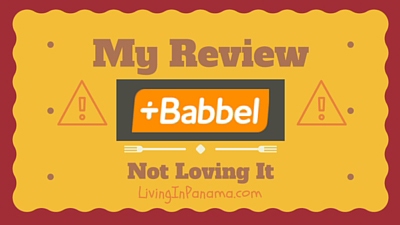
The good thing about Babbel is that it works hard to make sure you really learn the vocabulary in each lesson.
It focuses on 7 or 8 new words in each lesson. You hear, say, read, and spell each of those words. Multiple times in multiple ways.
However, I really did not enjoy Babbel.
I took lessons in 2 different Spanish courses: Shopping and Music.
Each lesson has a certain number of steps you need to take to complete it. While you can skip any one screen, you cannot skip around, and you never see a lesson overview.
I felt trapped in the lessons.
It was not dynamic, interactive (in the way I like) or engaging. It felt much more like learning from a book. I was almost immediately dismayed and bored.
Here are what the lessons look like. Click on any to see it larger.
Also, I never got the sense of where the lessons were taking me. Did I really need to know the words they were choosing to teach me?
I did learn how to read and write some words in both categories. But I wasn't learning how to construct sentences. It was unsatisfying.
Also, after using Rocket Language's excellent speaking component, I was very frustrated with Babbel's.
The microphone image in the 1st image above, is your opportunity to speak Spanish. Unfortunately, the method neither works well or is effective.
Babbel's voice-recognition system has issues.
The microphone turns into a green check when you say the word correctly. Or at least when the computer thinks you did. But you never hear the recording yourself. So you never know how you actually said the word.
I found Babbel's voice system of zero value, except as a way for me to practice patience.
It made me value Rocket Language's voice system even more. Rocket Language's excellent pronunciation feedback loop has been invaluable to me.
You can see my Spanish Rocket Language review here.
Check out the screenshots below to see the various Spanish courses that Babbel offers. When you sign up you can choose to do any or all of them. (click on images below to make larger)
You can check out the first lesson in each course for free. And you can do that for any of Babbel's 14 languages. You don't have to limit yourself to Spanish.
The price ranges from $7 - $13 a month. The longer you sign up for, the cheaper it is. $7 a month for 12 months, and $13 for one month.
If you buy the course, you have 20 days to get a full refund.
Yet another reason I like Rocket Language. You pay once, and you get a lifetime membership. Of course, you do have to pay more. But less than a year's membership with Babbel.
Once I review a few more Spanish programs, I will have to do a comparison of them.
If you only need to read or write Spanish, then Babbel could be a good choice for you.
You would have to check it out yourself at this link.
I am still very much liking Rocket Language (as you can tell by my comments).
To check out Rocket Language for free, go to their site here.
[leadplayer_vid id="56CDB580216A9"]

On Monday, February 22, the Panama band, Afrodisiaco, is competing in a 2016 International Song Festival. They will be performing their song, Coming from Panama (Viene de Panamá )
Led by Miroslava Herrera and Tatiana Rios, they will compete in the folklore category, along with
Comes From Panama was selected from more than 500 songs to participate in the competition folkloric Viña del Mar International Song Festival 2016.
Comes From Panama is a new song with the atravesao drum beat from the Azuero region of Panama. The drum has its origin in Africa. It was brought to Panama during the 16th century when there was slave trade from Angola, Cameroon, Guinea, Congo and other territories. European influences that are rooted in the region such as the violin, mejoranera (inspired guitar) are incorporated.
The band members say they chose Aphrodisiac as their name because it evokes the desire for freedom of the black slave in America, says Herrera.
Among long-term goals, the group to record songs representative of the origins of black drum provinces of Colon, Darien and the Azuero region.
I very much enjoyed their song. I hope they do well in the competition.
Viva Panama!
Sources:
PanamaNewsroom.com
Youtube video description of video above
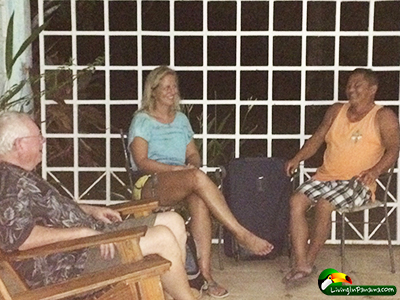
Currently, the only regularly scheduled event is Sunday afternoon horseshoes at the Tsunami Inn.
You don't need to actually play horseshoes to go. Some people, like me, go to socialize. However, players are very welcome.
And other expat get togethers just seem to happen.
For instance, on President's Day, we had a get together in Corazon de Jesus (see photos).
In this case, my husband, Reyn, initiated the get together.
Recently, a number of Americans and Canadians have been renting places in the Corazon de Jesus neighborhood. They said they they were interested in meeting people.
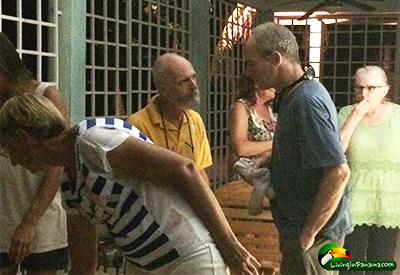
Reyn wanted to help them out.
He asked expats living on the beach there if they'd like to come to a BBQ potluck.
Most people loved the idea.
Lauren and Janet even volunteered the beach front house they are renting.
Thru word of mouth and emails, what was talked about on Friday, quickly became reality on Monday.
A potluck BBQ was born.
All sorts of folks came, both visitors and resident expats. It was a fun event.
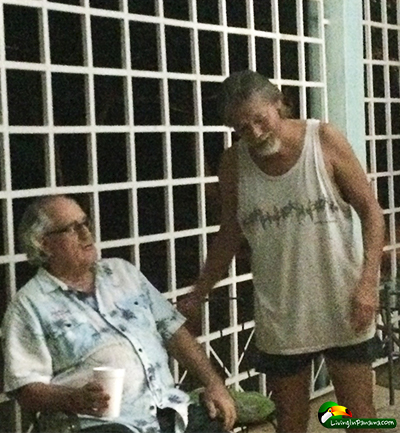
In fact, I keep hearing from people up and down the beach who say, they wished they could have made it.
I didn't think to take any photos until we were leaving. It was getting dark then, so the photos aren't the best.
I know quite a few people here who would come to regularly scheduled events. We only need someone to organize more of them.
Perhaps a Wednesday lunch or dinner at Milton's Heavenly Hotel? It has A/C!
All it takes is for someone to post it to the forum and/or email the first few times, and then it would take off.
Who is up for it?
To help celebrate I made this very brief (22 secs) video of some Cherrie's Tanagers.
All sorts of Tanagers are very common in our yard.
These Cherrie's Tanagers were in the palm tree next to my office window.
[leadplayer_vid id="56C8F29D20239"]
I get constant delight out of the bird life in Panama.
And so many other birds. I live much closer to nature here than I did in the States.
It isn't just birds. I watch iguanas from my living room, I see numerous toads, and a wide array of interesting looking caterpillars, butterflies, moths, and more.
Of and I cannot forget to mention geckos. They are nature in your house! I love watching them - plus they eat insects. I will have to do a video on them in the future.
I love living in nature here in Panama.
Do you have any thoughts to add on this topic?
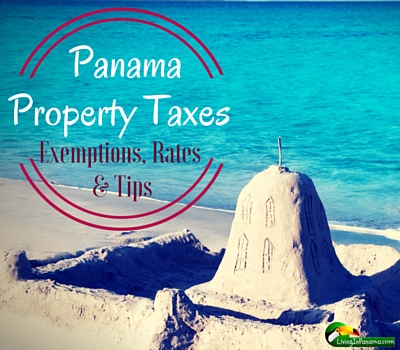
There are 3 property tax exemptions available for titled property in Panama.
FYI: Property taxes are only levied on titled land in Panama. Right of possession (ROP) property is not taxed.
Under the new tax law, as of January 1, 2019, Panama offers full property tax exemption as follows:
Therefore, if the total value of your primary property (land and improvements) is under $120,000, it is fully exempt from property taxes.
Here is an example of how Panama's graduated property tax system works.
Scroll down to find out how property value is determined in Panama.
Find out more about Panama's 2019 property tax reform.
This exemption applies to farmland that meets both of the criteria below.
This means that if you live at your farm, you may want to subdivide so that your home is on a separate lot from the farm. That way, your farm would be used exclusively for farming and may qualify for the exemption. Also, you may have to reapply for the agricultural exemption every 5 years.
This exemption applies only to new construction, not to the land.
If the building permit was issued after July 2009, the following new construction property tax exemptions apply.
Remember, to get the exemption, you must register the property with the Exonerations Department at the Ministry of Economy.
From 1990 - 2009, Panama had a very popular 20-year property tax exemption for new construction of houses and condos. Actually, you can still benefit from it if you buy a home that is still within its 20-year tax exemption time frame.
However, you will have to pay property taxes on its increase in value. For instance, if the home was valued at $200,000 when it was registered for the exemption, that is the value that the property tax exemption covers.
If you then buy that property for $250,000, you will need to pay taxes on the difference, its increase in value of $50,000. Although, you can re-register the property in order to get the exemption to cover the new, higher value. Keep in mind the re-registering process takes at least 6 months and you will need to hire a lawyer to do the process for you.
The new construction tax exemption belongs to the property, not the owner. That means the exemption transfers to all subsequent buyers during the exemption time frame.
This property tax exemption is on new construction only. The land itself is not exempted. You must pay property tax on the land if its value is more than the exemption threshold.
See the "property tax rate" section below for more information.
Keep in mind, to receive the exemption, you must register your property with the Exonerations Department at the Ministry of Economy.
Ideally, you should do that immediately after you notify the public registry that you are the new owner of the property.
No one is going to come out and assess the value of your property for tax purposes. The Panamanian government does not employ assessors. It is assumed that the sales price is the same as the property's value.
In Panama, a property's sales price also determines how much tax you will pay. Which is one reason that sometimes the sales price that appears in the purchase contract is less than the actual sales price of the land. That way, both the new and old owner's tax bill is lower for Panama's various real estate taxes: property, capital gains, transfer, and more.
There is no need to look for a property tax exemption for Rights of Possession (ROP) property. You don't need one. ROP Property is excluded from property taxes. It is simply never levied.
In fact, ROP property is excluded from all land transaction taxes (capital gains, transfer fee, as well as property taxes). Learn more about ROP property in Panama.
The property tax you pay depends upon the value of the property as follows:
Primary Residence
$0 – $120,000 = Exempt
$120,001 – $700,000 = 0.5% tax
$700,000+ = 0.7% tax
Secondary Residence, Commercial Properties, Industrial properties
$0 – $30,000 = Exempt
$30,001 – $250,000 = 0.6% tax
$250,001 – $500,000 = 0.8% tax
$500,000+ = 1.0% tax
Prior to 2019, the property tax exemptions were as follows: 1st $30K of value - exempt, $30 - $50K - 1.75%, $50 - $75K - 1.95%, $75K+ - 2.1%. Condos were taxes at slightly different rates: 1st $30K of value - exempt, $30 - $100K - 0.75%, $100K + - 1.0%>
Panama's property tax is a graduated tax. That means that the property tax on your $250,000 house is NOT $1200 (i.e., 0.5% of $250,000). The correct yearly property tax bill would be $650.
Using the rates above, here are the tax calculations for a primary residence purchased for $250,000:
This adds up to a yearly tax bill of $650 for a $250K house.
Of course, if you have a new construction tax exemption, you would subtract that first before you started calculating your tax.
You will never get a property tax bill - ever.
If you forget to pay your bill, your 1st, last, and only reminder will be when you sell the property. Then you will get a big bill that includes all your past taxes due, plus a hefty fine.
Actually, it's more of a lien than a bill. You will not be able to transfer the title to the new owner until you pay that bill.
Find out more about taxes required when a Panama property is bought and sold on this page of our site.
Looking to buy Panama real estate, check out our property for sale in Puerto Armuelles.
Disclaimer: I am not a tax expert. Please consult with a Panama real estate lawyer for more information.